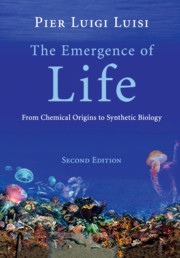Book contents
- Frontmatter
- Contents
- Acknowledgments
- Introduction
- Part I Approaches to the origin of life
- Part II What is life? The bio-logics of cellular life
- 6 Autopoiesis – the invariant property
- 7 Cognition
- Part III Order and organization in biological systems
- Part IV The world of vesicles
- Part V Towards the synthetic biology of minimal cells
- As a way of conclusion
- Appendix The open questions about the origin of life
- References
- Names index
- Subject index
7 - Cognition
from Part II - What is life? The bio-logics of cellular life
Published online by Cambridge University Press: 05 September 2016
- Frontmatter
- Contents
- Acknowledgments
- Introduction
- Part I Approaches to the origin of life
- Part II What is life? The bio-logics of cellular life
- 6 Autopoiesis – the invariant property
- 7 Cognition
- Part III Order and organization in biological systems
- Part IV The world of vesicles
- Part V Towards the synthetic biology of minimal cells
- As a way of conclusion
- Appendix The open questions about the origin of life
- References
- Names index
- Subject index
Summary
Introduction
As already mentioned, along with the question “What is life,” there was another question on Maturana's agenda, namely “What is cognition?” In general, autopoiesis is concerned with organization, and cognition with the “doing” of the organism in its environment. In investigating the relationship between these two questions, Maturana and Varela arrived at the conclusion that the two notions, life and cognition, are indissolubly linked to each other in the sense that one cannot exist without the other. The strong point about the notion of cognition in Maturana's and Varela's work, is that each living organism is considered to be cognitive – including bacteria.
I must say at this point that my view and treatment of cognition in autopoiesis may be seen as departing somehow from the strict original view of the Santiago School. The strict view is clearly given by Maturana in the conversation reported below, where he states:
Cognition is something that an observer says about a system, not a feature defining the system. Therefore, cognition is not a defining condition of a living system, not a defining condition of life.
My departure is due to the consideration that the theory of autopoiesis needs to handle explicitly the relation between the living and the environment; and for that one needs a “third person” phenomenology, without repeating all the time that we are in fact dealing with the view of the observer. We come back to this point more in detail in the next section. For the sake of this introduction, let me now return to a general overview of the subject.
The importance of the interaction between the living and the environment has been known since the early time in biology. One important reference in this regard is Claude Bernard, who worked in the middle of the nineteenth century. He introduced the notion of “milieu interieur” (Bernard, 1865), that is, internal milieu.
The French physiologist, who is accredited with the discovery of glycogen hydrolysis in the liver, is also accredited with the introduction of the notion of homeostasis, meant as resistance to change (although the term was coined later by the American physiologist Walter B. Cannon in the twentieth century).
- Type
- Chapter
- Information
- The Emergence of LifeFrom Chemical Origins to Synthetic Biology, pp. 157 - 188Publisher: Cambridge University PressPrint publication year: 2016



